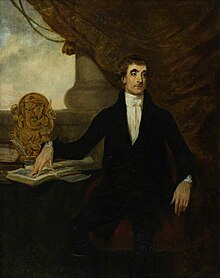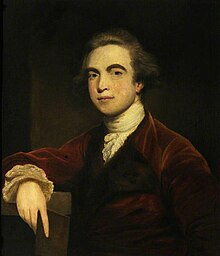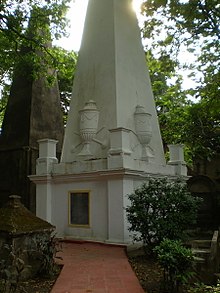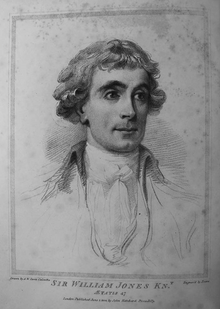William Jones (Orientalist)
Sir William Jones (born September 28, 1746 in London , † April 27, 1794 in Calcutta ) was a Welsh philologist and lawyer . From 1783 Jones was a judge at the Supreme Court of Bengal. The following year Jones founded the Asiatic Society . He carried out basic research on the Indo-European language family . Jones said he spoke 28 languages.
Education and career in England
William Jones' parents were Welsh Elizabeth Rowland and Welsh mathematician William Jones . The father died when Jones was three years old. From 1753 to 1764 Jones attended the elite boarding school Harrow . Jones proved to be a linguist and learned Greek, Latin, Hebrew and several modern languages of Europe.
After boarding school, Jones began studying at University College Oxford, graduating in 1770. In September 1766, the Bengali I'tisam-ud-Din of Persian descent came to London on behalf of the Grand Mogul Shah Alams II to negotiate with the British King about the activities of the East India Company. Oxford professor Thomas Hunt introduced the foreign diplomat to his model student Jones. In the years that followed, Jones learned Persian and Arabic from I'tisam-ud-Din.
The Indian historian Sanjay Subrahmanyam argues that European orientalists did not gain access to Indian mythology and Asian texts on their own, but were dependent on the help of educated locals. Without the support of I'tisam-ud-Din, Jones would not have been able to translate Persian literature into European languages.
From 1770 to 1773, Jones prepared for a legal career at Middle Temple . Meanwhile, Jones published translations from Persian and Arabic and wrote poetry. From 1774 to 1783 Jones practiced as a barrister in London.
philologist

While still studying at Oxford, William Jones translated the history of the wars written by the Persian court historian Mirza Mahdi in the 1750s by Nader Shah Tarikh-i-Jahangoshay-i-Naderi . In 1768 the Danish King Christian VII brought a Persian copy to England and asked Jones for a translation into French. Jones' translation appeared in 1770 as L'histoire de Nader Chah . Jones published A Grammar of the Persian Language the following year . In the introduction, Jones praises Persian as a "rich, melodic and elegant" language. Jones' Grammar is considered to be one of the first works to give the European audience systematic access to Asian languages. Jones complained that, despite its high quality, Persian had hardly been received in Europe at the time of publication.
In 1771, the French orientalist Abraham Hyacinthe Anquetil-Duperront published a translation of the sacred books of Zoroastrianism into a European language for the first time . In Zend-Avesta , Anquetil argues that Zoroaster is the author of the Avesta. As early as January 1762, Anquetil had argued in the Bodleian Library with Jones' later Professor John Swinton about the interpretation of Asian texts. Shortly after the appearance of Anquetil's Zend-Avesta , Jones questioned the authorship of Zoroaster and sharply attacked Anquetil in a pamphlet written in French. Jones' pamphlet was the prelude to further polemics between British and French Orientalists, which, as the "Anquetil Jones dispute", shaped the discussion about the interpretation of Asian texts in the last third of the 18th century.
After his transfer to the Supreme Court of Bengal in Calcutta, Jones learned Sanskrit from the locals: The Swiss orientalist and member of the Asiatick Society Antoine Polier reports in the mythology of the Indous, published posthumously in 1809 : “A happy coincidence brought me together with a man who possessed the qualities necessary to bridge my ignorance of Sanskrit and fulfill my desire for in-depth instruction in the mythological, primitive and fundamental beliefs of the Indians. This man's name was Ramtchund and he was the teacher of the famous Sir [William] Jones, who was my friend. "Polier describes Ramtchund as an upper-class Sikh who has acquired a comprehensive knowledge of the Puranas and is always accompanied by two literate Brahmins has been.
On January 15, 1784 Jones founded the " Asiatick Society" with 13 other colonial officials in Calcutta . The Asiatick Society was one of the first learned societies in Europe to explore a foreign continent. The founding members included the Bhagavad Gita translator Charles Wilkins and the later Gouveurneur of Bombay Jonathan Duncan . In a letter to the Governor General of Fort William Warren Hastings , Jones describes the purpose of the society as "the exploration of human and natural history, antiquity, the arts and sciences of Asia". Jones was President of the Asiatick Society until his death. As such, he gave an annual lecture to society members on his current research and published the journal Asiatick Researches , which appeared in the late 1780s . The society was renamed several times in the Asiatick Society of Bengal (1832-1935), The Royal Asiatick Society of Bengal (1936-1951) and Asiatic Society (1952-today). The cover of the Asiatic Society journal still bears Jones' portrait to this day.
With the thesis of a common origin of Sanskrit, Persian and the European language families, Jones made a contribution to the development of comparative linguistics . Similarities between Greek, Latin and Sanskrit were previously noted by Filippo Sassetti , Andreas Jäger , Benjamin Schulze and Gaston-Laurent Cœurdoux . 1767 French Orientalist Coeurdoux sent from India Mémoire to the Academie des inscriptions et Belles-lettres which detects an etymological, phonetic and grammatical similarity between Sanskrit, Greek and Latin. For the similarity with "la langue Sanskroutane", Coeurdoux names six possible explanations, including a "common origin" ( origine commune ). In English-language research, Jones is usually portrayed as the Orientalist who first put forward a thesis about an Indo-European original language . Jones presented his thesis in 1786 during a lecture to members of the Asiatick Society:
- The Sanscrit language, whatever be its antiquity, is of a wonderful structure; more perfect than the Greek , more copious than the Latin , and more exquisitely refined than either, yet bearing to both of them a stronger affinity, both in the roots of verbs and the forms of grammar, than could possibly have been produced by accident; so strong indeed, that no philologer could examine them all three, without believing them to have sprung from some common source, which, perhaps, no longer exists; there is a similar reason, though not quite so forcible, for supposing that both the Gothic and the Celtic , though blended with a very different idiom, had the same origin with the Sanscrit ; and the old Persian might be added to the same family […].
- (German: The Sanskrit language has - apart from its age - a wonderful structure; more perfect than Greek , more opulent than Latin and of more elegant refinement than both taken together. In addition, Sanskrit is one to both in terms of verb roots and grammatical forms The closeness is so pronounced that no philologist could examine all three without believing in a common origin, which may no longer exist. There are also - albeit a little less convincing - reasons to assume a common origin of the Gothic and Celtic and also the old Persian could be added to the same family [...].)
A collection of Jones' works was published in 1807 by John Shore in the thirteen volume series The works of Sir William Jones . Shore was from 1793 Governor General of Fort William and thus Jones' last employer in India. Jones was a Whig Party supporter who was critical of British royalty. The linguist Murray B. Emeneau noticed that Shore had suppressed as a prominent representative of the British Empire such letters and writings that a "radical image" ( radical image drawing) of Jones. Instead, Shore preferred sources that portray Jones as a sincere scientist and colonial official with integrity who always had the welfare of the British Empire and its Indian subjects in view. The Anglicist Garland Cannon published the two-volume collection The letters of Sir William Jones in 1970 . In contrast to the Works published by John Shore, Cannon's collection also contains letters expressing Jones' criticism of the British royal family and appreciation for the peculiarities of Indian religion.
Judge in India
William Jones had already sought a career as a judge at the Supreme Court of Bengal in Calcutta after graduating from Middle Temple. In 1783 Jones received the longed-for appeal to the Supreme Court. Jones was stationed in India until his death in 1794. As a judge, Jones had an annual income of about £ 7,500. This made Jones' income 37 times the median income of an East India Company employee with over 20 years of work experience (£ 200) and even 150 times that of an employee with less than five years of work experience (£ 50).
Jones believed that a British judge in India must have a thorough understanding of indigenous legal texts. A legal system must reflect the customs and religion of a people. Therefore, the English common law is only partially suitable for India. British judges in India also relied on the translation and interpretation of Indian legal texts by local experts. Jones biographer Garland Cannon points out that this could result in problems for neutrality in the case law, since "the Indian pundit or maulvis basically had no integrity or was bribable [...]". Jones estimated that it would take him two pandits for Sanskrit and two mawlawis for Islamic law and two scribes to translate basic legal texts for about three years. Jones estimated the cost of this team of translators at 1,000 rupees per month. 1792 published with The Mahomedan law of succession to property of intestates and Al Sira'Jiyyah; Or, the Mohammedan law of inheritance Translations on Islamic inheritance law. Two years later, Jones published the Institutes of Hindu Law . In the institutes , Jones translated the Sanskrit code of Manu and an accompanying commentary by Kulluka Bhatta (around 1150-1300).
Jones' Institutes played a prominent role in the judiciary of British India in the 19th and 20th centuries. The concentration on just two pieces of legislation has contributed to the marginalization of other Hindu legal traditions in the British colonial administration.
Jones advocated the independence of the Thirteen Colonies from Great Britain and, according to one of his biographers, was an advocate of "universal freedom for all peoples" In a letter to his American friend Arthur Lee in October 1786, Jones wrote that the introduction of Western freedoms in present-day India was impossible :
- But your observation of the Hindu is too just: they are incapable of civil liberty; few of them have an idea of it; and those, who have, do not wish it. They must (I deplore the evil, but know the necessity of it) be ruled by an absolute power; and I feel my pain much alleviated by knowing the natives themselves […] are happier under us than they were or could have been under the Sultans of Delhi or petty Rajas.
- (German: But your view of the Hindus is just enough: they are not capable of civil liberty; many of them have no idea of it; and those who have one do not want it. They have to (I regret the evil, but know about its necessity) to be ruled by an absolute power; and I feel my pain relieved by knowing that the natives themselves [...] are happier among us than they could have been among the Sultans of Delhi or common Rajas.)
reception
Mirza Abu Taleb Khan
Mirza Khan was one of the first Indians to complete a " Grand Tour " through Europe from 1799 to 1803 at the invitation of the East India Company . In his travel report Masir Talib fi Bilad Afranji (around 1805) the visitor of Persian origin mentions the reception of Asian knowledge by European orientalists. In the English translation Travels of Mirza Abu Taleb Khan (1814) it says of these: “As soon as one of them has the slightest insight [...] into the fundamentals of a foreign language, he sits down and prepares a work on the subject with the help of the printing press he distributes books that are no more valuable than children's toys [...]. " but his Persian grammar [...] is very flawed in many places. It is extremely unfortunate that his public offices have not allowed him to revise them [...]. "
Arthur Schopenhauer
In The World as Will and Idea (1819), Schopenhauer argues that the only truth given a priori is that every cognitive process breaks down into the subject and the object viewed. Schopenhauer quotes a longer passage from Jones' On the philosophy of the Asiatics in the original English:
- How early this basic truth was recognized by the sages of India, when it appears as the fundamental principle of the Vedanta philosophy ascribed to Vyasa , is testified by W. Jones in the last of his treatises: on the philosophy of the Asiatics; Asiatic researches, Vol. IV, p. 164: the fundamental tenet of the Vedanta school consisted not in denying the existence of matter, that is of solidity, impenetrability, and extended figure (to deny which would be lunacy), but in correcting the popular notion of it, and in contending that it has no essence independent of mental perception; that existence and perceptibility are convertible terms.
Edgar Allan Poe
For the horror short story Berenice (1835) Edgar Allan Poe borrowed Jones' translations of Persian poems. At the end of the short story, while reading a poem by Ebn Zaiat, the protagonist is informed that his beloved's grave has been desecrated. The poem quoted by Poe reads: “' Dicebant mihi sodales si sepulchrum amicæ visit arem visitarem curas meas aliquantulum fore levatas. [Italics by Poe] '“The Latin translation is provided with an asterisk, which refers to a translation made by Poe at the bottom of the page:“ My companions told me I might find some little alleviation of my misery, in visiting the grave of my beloved . ”Poe took the poem from Jones' poetry collection Poeseos Asiaticae Commentariorum Libri Sex . The Latin translation can be found in Jones under Ibn Zaiat's poem in Arabic script: "'Dicebant mihi sodales, si sepulchrum amicae visitarem (curas meas aliquantulum fore levatas), / Dixi autem, An ideò aliud praeter pectus habet sepulchrum?'"
Sanjay Subrahmanyam
In Europe's India (2017), the Indian historian Subrahmanyam examines the process of acquisition of Asian knowledge by European orientalists. Subrahmanyam describes Jones as "a judge and bureaucrat with a kind of exaggerated assessment of his own abilities and competencies."
Jones biographies
The first biography of William Jones was published by the Governor General of Fort William John Shore under the title Memoirs, of the life, writings and correspondence of Sir William Jones (1804). The second biography, Sir William Jones, the Learned Oriental Scholar , presented Henry Morris in 1901. On the occasion of Jones' 200th year of birth, the British orientalist Arthur John Arberry published the 46-page biography Asiatic Jones: The Life and Influence of Sir William Jones. In the same year the Royal Asiatic Society of Bengal issued the commemorative publication Sir William Jones: bicentenary of his birth; commemoration volume, 1746-1946 . The fourth - and so far the most comprehensive biography - was published by the American Anglicist Garland Cannon in 1990. In The Life and Mind of Oriental Jones , Cannon criticizes the fact that the biographies of Shore and Morris made Jones “a kind of Christian missionary” and suppressed his admiration for Hinduism.
factories
- About the music of the Indians. Meyer and Marfurt, Erfurt 1802 (e-book of the University Library Vienna )
literature
- Raphael Arnold: William Jones. An orientalist between colonialism and the Enlightenment. Ergon-Verlag, Würzburg 2001 ( Working materials on the Orient. Volume 11), ISBN 3-935556-66-7 .
- Garland Cannon, Kevin Brine: Objects of inquiry: life, contributions and influence of Sir William Jones. New York [u. a.] 1995, ISBN 0-8147-1517-6 .
- Harald Wiese: A journey through time to the origins of our language. How Indo-European Studies explains our words. Logos Verlag, Berlin 2007.
- Henry Morse Stephens : Jones, William (1746-1794) . In: Sidney Lee (Ed.): Dictionary of National Biography . tape 30 : Johnes - Kenneth . MacMillan & Co, Smith, Elder & Co., New York City / London 1892, p. 174–177 (English, full text [ Wikisource ] - scan available, poor OCR).
- Michael J. Franklin: Jones, Sir William (1746-1794), orientalist and judge. In: Henry Colin Gray Matthew, Brian Harrison (Eds.): Oxford Dictionary of National Biography , from the earliest times to the year 2000 (ODNB). Oxford University Press, Oxford 2004, ISBN 0-19-861411-X , ( oxforddnb.com license required ), as of May 2011
- Jones, Sir William . In: Encyclopædia Britannica . 11th edition. tape 15 : Italy - Kyshtym . London 1911, p. 501 (English, full text [ Wikisource ]).
- Jones, William . In: John Venn , John Archibald Venn (eds.): Alumni Cantabrigienses . A Biographical List of All Known Students, Graduates and Holders of Office at the University of Cambridge, from the Earliest Times to 1900. Part 1: From the earliest times to 1751 , volume 2 : Dabbs-Juxton . Cambridge University Press, Cambridge 1922, pp. 498 ( venn.lib.cam.ac.uk Textarchiv - Internet Archive ).
- Urs App: William Jones's Ancient Theology. (PDF; 3.7 MB) In: Sino-Platonic Papers. No. 191, July 2009, 125 pp.
- Garland Cannon: Sir William Jones, Persian, Sanskrit, and the Asiatic Society. (PDF; 3.56 MB) In: Histoire, Epistémologie, Langage. Volume 6, No. 2, 1984, pp. 83-94.
Web links
- The works of Sir William Jones in the 1807 edition of HaithiTrust
- Sir William Jones on the Internet Archive
- Entry on Jones, Sir William (1746–1794) in the Archives of the Royal Society , London
- Sir William Jones. In: Encyclopædia Britannica . Retrieved April 14, 2009 .
Individual evidence
- ^ William Jones: The works of Sir William Jones . tape 2 . John Stockdale, London 1807, p. 264 (English, babel.hathitrust.org ).
- ↑ Kapil Raj: Cartographier l'humanité depuis Calcutta: à propos de la théorie ethnolinguistique de Sir William Jones (1746-1794) . In: Littérature . December 2016, p. 1 , doi : 10.3917 / litt.184.0021 (French).
- ↑ Sanjay Subrahmanyam: Europe's India. Words, People, Empires, 1500-1800 . Harvard University Press, Cambridge, MA / London 2017, ISBN 978-0-674-97226-1 , pp. 313 (English).
- ^ Garland Cannon: The life and mind of Oriental Jones. Sir William Jones, the father of modern linguistics . Cambridge University Press, Cambridge 1990, ISBN 978-0-521-39149-8 , pp. xviii-xix .
- ^ William Jones: L'Histoire de Nader Chah . In: The Works of Sir William Jones . tape 5 . London 1799 (French, archive.org ).
- ^ William Jones: A Grammar of the Persian Language . In: GG and J. Robinson (Eds.): The Works of Sir William Jones . tape 2 . London 1799, p. 121–332, here: p. 121 (English, archive.org ).
- ^ Abraham Hyacinthe Anquetil-Duperront: Zend-Avesta, Ouvrage de Zoroastre . tape 1 . NM Tilliand, Paris 1771 (French, archive.org ).
- ↑ Sanjay Subrahmanyam: Europe's India, Words, People, Empires, 1500-1800 . Harvard University Press, Cambridge, MA / London 2017, ISBN 978-0-674-97226-1 , pp. 208-209 (English).
- ^ William Jones: Lettre à Monsieur A *** [rquentil] du P *** [erron] dans laquelle es compris l'examen de sa traduction des livres attribués à Zoroastre . P. Elmsly, London 1771 (French, gallica.bnf.fr ).
- ↑ Antoine Polier: Mythology of the Indous . Ed .: Marie-Elisabeth Polier. tape 1 . F. Schoell, Rudolstadt / Paris 1809, p. xii (French).
- ^ William Jones et al .: The Introduction . In: Asiatick Researches . 5th edition. tape 1 . London 1806, p. v (English, archive.org ).
- ↑ Gaston-Laurent Coeurdoux: Supplément au mémoire qui precede . In: Mémoire de littérature, tirés des régistres de l'Academie Royale des Inscriptions et Belles-Lettres . tape 49 . Imprimérie Impériale, Paris 1808, p. 647–712, here: pp. 659–660 (French, books.google.co.id ).
- ^ Garland Cannon: The Life and Mind of Oriental Jones. Sir William Jones, the Father of Modern Linguistics . Cambridge University Press, Cambridge 1990, ISBN 978-0-521-39149-8 , pp. 242-243 (English).
- ^ William Jones: The Third Anniversary Discourse, on the Hindus, delivered 2nd of February, 1786 . In: The Works of Sir William Jones . tape 1 . London 1799, p. 19–34, here: pp. 26–27 ( Textarchiv - Internet Archive ).
- ↑ Michael Bonner: Reviewed Work: The Life and Mind of Oriental Jones. Sir William Jones, the Father of Modern Linguistics. By Garland Cannon . In: Eighteenth-Century Studies . tape 26 , no. 1 , 1992, p. 189–191, here: p. 190 (English).
- ↑ a b Murray B. Emeneau: Reviewed Work: The Letters of Sir William Jones by Garland Cannon . In: Language . tape 47 , no. 4 , December 1971, p. 959-964, here: p. 959 , doi : 10.2307 / 412175 (English).
- ^ Garland Cannon: The life and mind of Oriental Jones. Sir William Jones, the father of modern linguistics . Cambridge University Press, Cambridge 1990, ISBN 978-0-521-39149-8 , pp. xviii – xix .
- ^ Garland Cannon: The life and mind of Oriental Jones . S. 269 .
- ^ Mac Boot: Real Incomes of the British Middle Class, 1760-1850: The Experience of Clerks at the East India Company . Ed .: The Economic History Review New Series. tape 52 , no. 4 , November 1999, pp. 638–668, here: pp. 638, 643 (English).
- ^ Garland Cannon: The life and mind of Oriental Jones. Sir William Jones, the father of modern linguistics . Cambridge University Press, Cambridge / New York 1990, ISBN 978-0-521-39149-8 , pp. 258 (English).
- ↑ William Jones: The Mahomedan law of succession to property of intestates . In: The Works of Sir William Jones . tape 6 . London 1799, p. 469–506 (English, Textarchiv - Internet Archive ).
- ↑ William Jones: Al Sira'Jiyyah; Or, the Mohammedan law of inheritance . In: The Works of Sir William Jones . tape 6 . London 1799, p. 507–555 (English, Textarchiv - Internet Archive ).
- ^ William Jones: Institutes of Hindu Law: Or, the Ordinances of Menu, according to the gloss of Cúlluca. In: The Works of Sir William Jones . tape 6 . Calcutta / London 1796 (Sanskrit, English, archive.org ).
- ^ Garland Cannon: The life and mind of Oriental Jones . S. 260 .
- ^ William Jones: The letters of Sir William Jones . Ed .: Garland Cannon. tape 2 . Clarendon Press, Oxford 1970, ISBN 978-0-19-812404-7 , pp. 712 .
- ↑ Mirza Abu Taleb Khan: Travels of Mirza Abu Taleb Khan. (Transl.) . Ed .: Charles Steward. tape 2 . Longman Hurst, London 1814, p. 142–144 (English, Textarchiv - Internet Archive ).
- ↑ Arthur Schopenhauer: The world as will and idea . In: Digital Library (Ed.): Volume 2: Philosophy . tape 63076 , 1819, pp. 39-40 ( ia802804.us.archive.org [PDF]).
- ↑ Edgar Allan Poe: Berenice - A Tale . Ed .: Southern Literary Messenger. tape 1 , no. 7 , March 1835, p. 333–336, here: p. 335 (English, eapoe.org ).
- ↑ William Jones: Poeseos Asiatic commentarorium libri sex, caput XIII. - De poesi funebri . In: The Works of Sir William Jones . tape 2 . London 1799, p. 518-530, here: 520 (English, text archive - Internet Archive ).
- ^ Sanjay Subrahmanjam: Europe's India. Words, People, Empires, 1500-1800 . Harvard University Press, Cambridge, MA / London 2017, ISBN 978-0-674-97226-1 , pp. 41 .
- ^ Lord Teignmouth (John Shore): Memoirs of the life, writings and correspondence of Sir William Jones . John Hatchard, London 1804 (English, archive.org ).
- ↑ Garland Cannon: Oriental Jones . S. xi .
| personal data | |
|---|---|
| SURNAME | Jones, William |
| BRIEF DESCRIPTION | English orientalist and lawyer |
| BIRTH DATE | September 28, 1746 |
| PLACE OF BIRTH | London |
| DATE OF DEATH | April 27, 1794 |
| PLACE OF DEATH | Calcutta |



